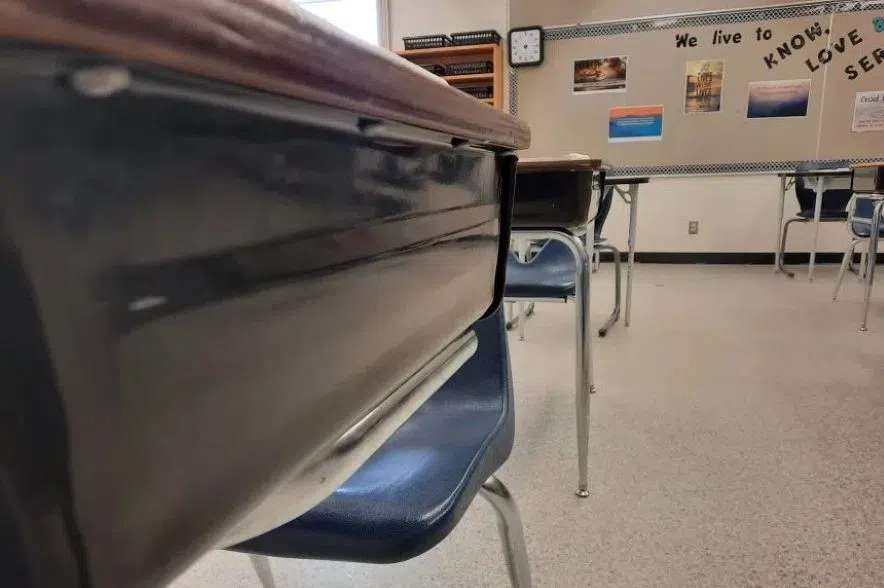A pilot project is set to launch in eight Saskatchewan school divisions to test methods of managing behavioural incidents in classrooms.
On Monday, the Saskatchewan government announced it’s putting up $3.6 million in funding for specialized support classrooms. The pilot project is to begin in February and run until the end of the 2024-25 school year.
The participating school divisions are Living Sky, Light of Christ Catholic, Prince Albert Catholic, Saskatchewan Rivers Public, Greater Saskatoon Catholic, Saskatoon Public, Regina Catholic and Regina Public. Each division will choose the schools that will participate in the project.
“We have heard from Saskatchewan teachers that they need to spend more of their time teaching rather than managing disruptive behaviour,” Education Minister Jeremy Cockrill said in a media release. “This pilot aims to support students to continue their studies uninterrupted but also assists students who need targeted interventions in the short term.”
Class complexity and violence in classrooms are two concerns that teachers have raised during ongoing collective bargaining negotiations with the province.
Samantha Becotte, the president of the Saskatchewan Teachers’ Federation, said the pilot program is an admission that there are problems in the school systems.
“It is a clear admission of government that they agree that class complexity is increasing and needs to be addressed and that additional funds are needed,” said Becotte.
She said the program is a way for the government to avoid one of the sticking points in contract talks. In October, the teachers’ union voted in favour of sanctions after declaring an impasse in negotiations.
“We also believe that this is government’s way of attempting to yet again sidestep our collective bargaining process,” said Becotte.
The union president said class complexity is one of many problems that need to be addressed.
“It’s good to see that (government officials) are starting to address some of the issues, but like I said, our schools have been so critically underfunded that those professional supports just aren’t there, and we need to ensure that all students are getting the support they need,” Becotte said.
According to the government, the pilot project will “provide a classroom with specialized supports to help students practise self-regulation skills while also addressing the impacts of disruptions in the home classroom.”
A minimum of one teacher and two educational assistants will be in the specialized support classroom, which will have a capacity of 15 students. Other supports like psychologists and counsellors will be available to assist staff.
The government said the pilot would provide “long-term solutions to evaluate targeted intervention methods” and help teachers manage complex classrooms.
“We are excited to be part of the specialized support classroom project and appreciate the additional resources that will be provided to the school division to implement this initiative,” Saskatoon Public Schools board chair Kim Stranden said in the release.
“Our staff is looking forward to working collaboratively with the Ministry of Education to develop a plan that supports our students. We know this project will have a positive impact on teaching and learning in one of our elementary schools.”
The ministry is to work with the school divisions as they develop their individual plans for the classrooms. The schools that are to participate will create procedures to identify the behaviour in question and required interventions, and will inform parents and guardians of students who are to be taught in the specialized support classrooms.
The funding for the pilot project is on top of the $40 million that school divisions received from the government in June.
NDP responds to announcement
The Opposition NDP wasn’t impressed with the program, with Education Critic Matt Love pointing to its scope.
“This new pilot program will only target eight urban classrooms without any additional classroom supports for any rural students and schools,” Love wrote in an emailed statement. “This will affect less than one per cent of students in Saskatchewan. Scott Moe just doesn’t understand how big this problem is.
“All students and educators, regardless of whether they live in rural or urban, deserve a government that is dedicated to ensuring their success and delivering real results. After 10 years of funding cuts, it’s clear that this Sask. Party government is not prioritizing the future of our province.”











